Standards, Regulations & Compliance
Trump Has Pledged to ‘Support AI Development’ But Not Yet Shared Specifics

President Donald Trump on the first day of his second term fulfilled a campaign promise to rescind an executive order designed to curb the risk posed by powerful artificial intelligence models to consumers and national security. The Trump administration has not yet previewed any replacement.
See Also: Mitigating Data Exposure Risks in Enterprise LLM Applications
Former President Joe Biden’s October 2023 executive order directed the Commerce Department’s National Institute of Standards and Technology to offer guidance to companies developing powerful AI models to identify and fix flaws in their models. The executive order also required that AI system developers conduct safety tests and share results with the government before releasing them to the public.
The Biden administration said the order was designed “to strengthen AI safety and security, protect Americans’ privacy, advance equity and civil rights, stand up for consumers and workers, promote innovation and competition, advance American leadership around the world and more.” Many of the executive order’s requirements have already been implemented across federal agencies (see: Biden’s AI Executive Order, 90 Days On).
What revoking the executive order might mean in practice remains unclear, pending what the new administration does next. “
One former official in Biden’s White House Office of Science and Technology Policy, Suresh Venkatasubramanian, last November claimed to Nextgov/FCW that that if the order was revoked, “we will have no protections at all.”
The AI executive order is among nearly 80 such orders that Trump rescinded upon taking office.
Executive orders aren’t necessarily more than memos to the executive branch,” said political scientist Jonathan Ladd in a post to social platform Bluesky. “If the president has discretion under the law, the order is specific, and the bureaucracy carries it out, an order can have huge consequences. But sometimes, it can have little to no effect. Or anywhere in between.”
Biden last week issued a separate executive order to provide federal support to address the energy needs for fast-growing, advanced AI data centers. Trump did not repeal that order.
Trump’s repeal of Biden’s AI executive order has long been previewed. On the campaign trail, he criticized it as being a “dangerous” barrier to innovation, and campaigned on a platform that pledged to “support AI development rooted in free speech and human flourishing.”
His campaign has not shared any details about what Trump’s AI policy might look like, although his administration has tapped former PayPal COO David Sacks to serve as the White House AI and crypto czar.
Trump is no stranger to AI. He made it a priority in his first term, signing an executive order in February 2019 to promote its research and development, as well as deployment.
He also signed a second executive order in December 2020 to promote trustworthy AI.
The Biden administration kept those AI executive orders on the books. A new Stanford University study reported that federal agencies implemented strong AI governance controls under Biden’s aegis.
With reporting from Information Security Media Group’s Mathew Schwartz in Dundee, Scotland.
